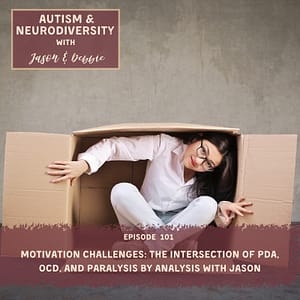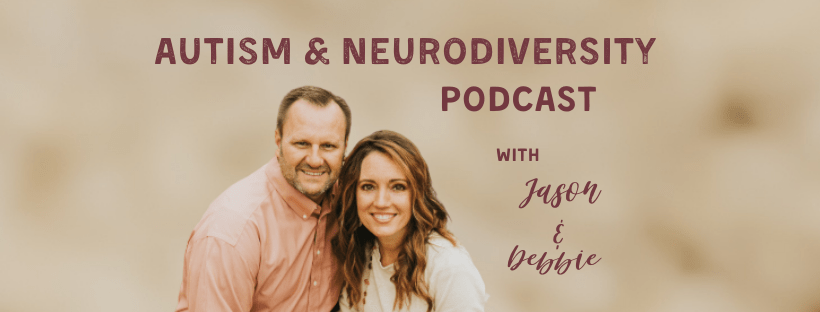Speaker A: Welcome to the Autism and neurodiversity podcast.
Speaker B: We’re here to bring you helpful information from leading experts and give you effective tools and support. I’m Jason Grygla, a licensed counselor and founder of techie for Life, a specialized mentoring program for neurodiverse young adults.
Speaker A: And I’m Debbie Grygla, a certified life coach. And maybe most importantly, we’re also parents, parents to our own atypical Young Adults.
Speaker A: Friends. Hello. Welcome. If you tend to engage in power struggles, if you’re not loving it the experience of power struggles. If you would like to avoid getting into power struggles, you’re going to want to keep listening today. And even if you don’t do them, you’ll probably still get some good nuggets here. But we all lose when we engage in power struggles, especially our autistic and our neurodivergent children, teens and young adults. They really lose when we engage in power struggles.
Good parenting involves connection and collaboration and deeper relationships, right? Safety in those relationships. And we want to be able to parent from relationships of influence, connection, trust. And unfortunately, power struggles actually destroy all that. They hurt our relationships and they block our ability to have any kind of influence. And what happens is, when we get into a power struggle, it’s usually that we’re in our lower brain fight, flight, freeze, stress, threat, response, limbic system. We’re in that state. And when we’re in a power struggle, our young person is too.
And so they’re either going to fight or they’re going to try to get away from you, or they’re going to freeze up and shut down, or they might try to people please and mask. And a lot of our neuro divergence will fall into that masking category where they will pretend to do it. They’ll use all their willpower to be compliant because they don’t want to upset you and they don’t want to be in trouble. And it actually causes a lot of mental health challenges and more severe problems later on, and it inhibits development.
So today I want to talk to you about power struggles and help you get to a place where you’re able to parent where you’re not using those. Like that’s just not a thing for you anymore. And that’s a really good place to be, and that’s where you want to be if your goal is to support their overall mental health sense of wellbeing and their development and success and what that looks like for them.
So it’s really important to understand that one of the things that can send us into power struggles and rely on those in our parenting is when we have a behavioral approach or when we have a behavioral mindset to our parenting. And the thing with behavioral approaches is you’re focused on the behavior, and you are judging the behavior. Instead of seeing behavior as something to assess, that gives you information about what kind of mental, emotional, behavioral state your child is in or where they’re at. Developmentally, when you take a behavioral approach, you’re looking at that behavior is good or that behavior is bad. And my job as a parent is to make them have good behavior or stop them from having bad behavior.
It is kind of the mentality and way that a lot of people have parented in the past or society has viewed things. And it’s often the way that a lot of us have been parented or that’s what’s been modeled and that’s what’s communicated in society. I mean, I do see it all the time, like on Facebook in different places where a kid does something bad and the first thing that people will jump on and do is say, oh, the parents didn’t teach them. It’s the parents fault. If they were good parents, their kid wouldn’t be behaving that way.
And so there’s this behavioral sort of mindset that we have as a society, and it’s very ingrained in schools and in workplaces. And I want to offer to you that behavioral approaches, when you have that and you’re like, my kid needs to obey me. If they don’t respect me, then if they’re behaving badly, that means they don’t respect me. And we kind of see ourself in that power position, actually, that mindset that I’m in charge and I’m in control and my kid needs to obey me. That is a false sense of control. When you’re coming at it from a behavioral mindset, you have a false sense of responsibility and control.
You actually don’t have any control over your child’s behavior. You really don’t like, you could do things to punish, but you actually have zero control over what they do or what they don’t do or what they’re thinking or what they’re feeling. We don’t have that much control, and thank goodness. I don’t want to be responsible for everybody’s emotions and how they show up. But it is a false sense. Going into a behavioral approach is putting yourself in that power position of like, well, if I do my job right, my kid will behave well. That’s just not even honest. You’re already going in with a false belief. So you really want to catch when you’re going into a behavioral mindset, that is not serving you and it’s not accurate. And honestly, their behaviors, that idea that they’re good or they’re bad, is not serving us either as parents. That behavior is important information.
When you take a developmental mentoring approach like the Jason and I teach, where you practice NDM Neuro-developmental mentoring as a parent, it’s a total shift. It’s like I accept and I look at where is my child at, where is my teen at, where’s my young adult at? And who are they and how are they? And I look at where are they at developmentally and what is their mental, emotional, behavioral state that they’re in. And then I focus on supporting them and moving into higher brain states, and I focus on how can I support their development and their growth and their overall sense of well being, then I’m not getting into power struggles at all. My focus is on supporting them.
It’s not about trying to control them because I’m the boss, I’m the parent, and you’re supposed to do what I say. My goal is I’m your parent and mentor, and my goal is to help you develop into the fullest you that you can be, right? My goal is to help you be able to do the things you want to do in life. My goal is to help you explore what those are. My goal is to support you. And if you have disabilities, if you have challenges that are keeping you stuck, how can I support you in figuring out workarounds and how to accommodate yourself in the world so that you can have a quality of life?
When we do the power struggle and we fight, we both lose. It feels terrible on our end. We think we have this false sense of control, and it always gets proven wrong, right? Like, you are not as in control as you think you are of somebody else. And they lose because they lose some autonomy and they are more in a lower brain state. They’re going to fight against it if they have that willpower to do it. A lot of our autistic and neurodivergence actually have less willpower, and they actually will bleed away. They’ll avoid, they will be passive aggressive. They will do anything they can to accommodate you and keep you happy, but then they can only sustain that for so long, right? They’ll mask and try to pretend that they’re more capable than they are to please you, and it creates a lot of mental health issues.
We see it when we get young adults that come to our program, Techie For Life, where we mentor autistic and neuro divergent young adults. We see a lot of young adults that we can’t even begin to mentor their growth and development until we work through all the mental health crap that has accompanied their attempting to mask and be something they’re not. All of the shame that comes with thinking they should be more functional than they are or more capable than they are, and why aren’t they doing what their peers are doing? And all that shame just blocks any ability for them to actually grow and develop and see what they’re actually capable of.
So I want to encourage you to recognize our struggles for what they are and to recognize that when you are engaging in a power struggle, that you are parenting from your lower brain nervous system survival threat response. And that is not your best parenting. And when you’re parenting from that state, you are often triggering that state in your autistic or neuro divergent. Some neurotypical kids are able to handle it, or my dad’s just losing it, or my mom’s just being crazy right now. That’s her problem. And they’re like able to see it. But a lot of our autistic and neuro divergence aren’t able to have that level of awareness or they just easily sense that emotion and they are either going to fight or fly or they go into a lower brain response.
I’ve seen it too, where you have adults or teachers or different people in positions where they could exert power and they do, and they think, look, I’m such a great teacher or I’m such a great parent because my kid is being compliant or my classroom is compliant. But when they’re using lower brain fight, they’re using fear and power tactics, they’re actually doing so much damage. They don’t see it in the moment, but it causes so much damage down the road. And I think we need to start recognizing that a kid that is existing in fear and behaving well because they’re afraid is not a child that’s developing. That’s a child stuck in fear. And that’s not the goal. That is not what we want to be doing as mentors.
We want to be mentoring them to have confidence and security and to sneak on challenges and do discomfort and be able to grow and develop and explore and feel good about themselves, not be afraid to disappoint the adults that are in a power position in their life. So what do we do you want to look at? Where are you getting into power struggles? What areas or what things? Is it trying to get out the door? Are you engaging in a power struggle and fight them to get out the door? Or are you engaging in power struggles around their gaming? Or maybe you’re engaging in power struggles around their room getting clean. Or maybe you’re getting into power struggles about their grades. So look at where are you getting into power struggles or what times of day are you getting into them? What are the circumstances around it? Take a look at it and actually ask yourself why? Why do you think you’re engaging in power struggles?
And then take a look at that and just question what’s actually in your control and what’s not. And if you are being honest with yourself, you’re going to realize that there’s a lot less in your control than you think. And remember that when you’re trying to control your child, your teen, your young adult, when you’re trying to control their behavior, that you’re actually reducing your ability to have influence in their life. And if you really think about it, that’s not the trade off you want to make.
You might get a little behavioral compliance now, but you’re reducing overall influence later in connection. And that’s something that is in our control, is our relationship with our young person. And we don’t want to diminish what we actually have control over, which is how we relate to them, how we connect to our child. And if we’re doing it from a place of power and they’re sensing that power, we’re doing a lot of damage to our relationship. So you want to shift it and look at those areas where you are falling into power struggles. Kind of look at why. Why is this area, what’s going on for you? What is actually in your control? And then think about how can you actually connect and support development in that area or at those times instead of trying to control it and make it go a certain way or get your kid to submit.
Look at how can you actually connect around those times and actually support their capabilities, support their development, support building resilience or maturity. Support them and see if you don’t come to new ways to interact when we are willing to go in and look at that and explore it, because we can’t just will pair out of this, right? Like if we have deep down beliefs that a child should behave a certain way and we’re like, oh no, they’re not, this is danger. Oh no, we shift into lower brain response and then we’re parenting and falling into power struggles.
But when you’re willing to take a look at it and see where this is happening for you and then think about how you can actually connect around those areas, you’re going to be able to come at it from a whole different direction. And now those areas that were a place source of problem and stress can actually be areas where you actually are able to connect and support development like never before.
So there’s a real opportunity when you’re willing to do the discomfort of actually looking at where you’re falling into power struggles and own your own role in that and then use those actually as an opportunity to actually build a relationship of influence with your young person. It’s work worth doing. And I encourage you, if you do struggle in this area, to keep following along, listening to our podcast and get on our email list and get the support you need to be able to break the pattern of our struggles. They’re just not worth it. I hope you have an amazing week. Take care.
Speaker A: Thanks for joining us on this episode of Autism and neurodiversity with Jason and Debbie. If you want to learn more about our work, come visit us at JasonDebbie.com, that’s JasonDebbie.com.




